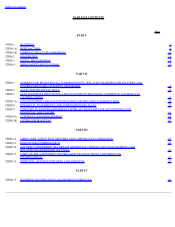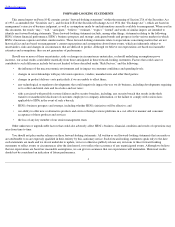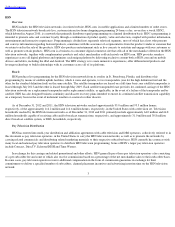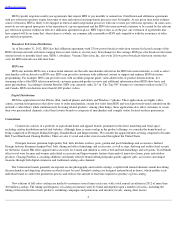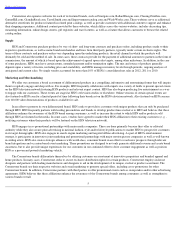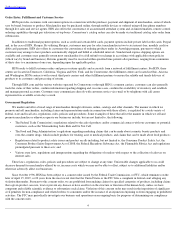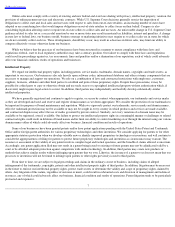Home Shopping Network 2012 Annual Report Download - page 14
Download and view the complete annual report
Please find page 14 of the 2012 Home Shopping Network annual report below. You can navigate through the pages in the report by either clicking on the pages listed below, or by using the keyword search tool below to find specific information within the annual report.
Table of Contents
The failure to attract and retain television viewers and secure a suitable programming tier of carriage and channel placement for the
HSN television network programming could result in a decrease in revenue.
We are dependent, in part, upon the continued ability of HSN to compete effectively for television viewers. Effectively competing for
television viewers is dependent, in substantial part, on the ability of HSN to secure suitable placement of the HSN television networks within a
suitable programming tier and to effectively compete against others for the leisure and entertainment time of consumers. The advent of digital
compression technologies and the adoption of digital cable has resulted in increased channel capacity. In addition, there are now more
programming options available to the viewing public in the form of new television networks and time-shifted viewing ( e.g. , personal video
recorders, video-on-demand, interactive television and streaming video over broadband internet connections as well as increased access to
various media through wireless devices). These have the potential to reduce the viewing of our content. New technologies have been and will
continue to be developed that increase the number of entertainment choices available and the manners in which they are delivered. Our failure to
effectively anticipate or adapt to emerging technologies or changes in consumer behavior could have an adverse impact on our competitive
position, business and results of operations.
A prolonged or permanent inability to broadcast the HSN television networks would result in lost customers and lost sales.
Our success is dependent upon the continued ability of HSN to transmit the HSN television networks to broadcast and pay television
operators from its satellite uplink facilities, which transmission is subject to the Federal Communications Commission (“FCC”) compliance.
HSN has entered into two satellite transponder leases to provide for continued carriage of the HSN television networks on a replacement
transponder and/or replacement satellite, as applicable, in the event of a failure of the transponder and/or satellite. Although we believe that
every reasonable measure is being taken to ensure continued satellite transmission capability, termination or interruption of satellite
transmissions may occur.
System interruption and the lack of integration and redundancy in these systems and infrastructures may adversely affect our ability to
operate websites, process and fulfill transactions, respond to customer inquiries and generally maintain cost-efficient operations.
We use the internet, mobile devices, social networking and other online activities to connect with our customers. Our success depends, in
part, on our ability to maintain the integrity of our systems and infrastructures, including websites, information and related systems, call centers
and fulfillment facilities. We may experience occasional system interruptions, including those caused by system conversions, that make some or
all systems or data unavailable or prevent our businesses from efficiently providing services or fulfilling orders. We also rely on affiliate and
third-party computer systems, broadband and other communications systems and service providers in connection with the provision of services
generally, as well as to facilitate, process and fulfill transactions. Any interruptions, outages or delays in our systems and infrastructures, our
businesses, our affiliates and/or third parties, or deterioration in the performance of these systems and infrastructures, could impair our ability to
provide services, fulfill orders and/or process transactions. Fire, flood, power loss, telecommunications failure, hurricanes, tornadoes,
earthquakes, acts of war or terrorism, acts of God and similar events or disruptions may damage or interrupt computer, broadband or other
communications systems and infrastructures at any time. In addition, we have observed an increase in the number of cyber attacks that include
gaining access to digital systems for purposes of corrupting data or causing operational disruption. Any of these events could cause system
interruption, delays and loss of critical data, and could prevent us from providing services, fulfilling orders and/or processing transactions. While
we have backup systems for certain aspects of our operations, these systems are not fully redundant and disaster recovery planning is not
sufficient for all eventualities. In addition, we may not have adequate insurance coverage to compensate for losses from a major interruption.
The processing, storage, use and disclosure of personal data could give rise to liabilities as a result of governmental regulation,
conflicting legal requirements or differing views of personal privacy rights.
In the processing of consumer transactions, we receive, transmit and store a large volume of personally identifiable information and other
user data. The sharing, use, disclosure and protection of this information are governed by the privacy and data security policies maintained by us.
Moreover, there are federal, state and international laws regarding privacy and the storing, sharing, use, disclosure and protection of personally
identifiable information and user data. Specifically, personally identifiable information is increasingly subject to legislation and regulations in
numerous jurisdictions around the world, the intent of which is to protect the privacy of personal information that is collected, processed and
transmitted in or from the governing jurisdiction. We could be adversely affected if legislation or regulations are expanded to require changes in
business practices or privacy policies, or if governing jurisdictions interpret or implement their legislation or regulations in ways that negatively
affect our business, financial condition and results of operations.
10


